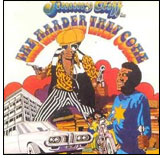Movies |
The Harder They Come
By
Published: Nov 26, 2023
Category:
Drama
As I write, it’s 38 degrees in New York. In Negril, where I spent the most joyous holidays of the last decade, I’d be finishing a beach walk, waving off the weed purveyors, getting ready for a delicious morning discussing this and that as my friends and I floated in the warm, clean water. The early riser in our crew would have claimed chaises on the beach, and there, at some point, I’d sit with a book, marking passages I’d want to think about back in New York. And if I let myself doze and dream, I might return to 1972, when I watched the Wailers smoke huge blunts of killer weed backstage and then sing in flawless harmony, and I pitched a movie to Bob Marley (he drew a simple map: “This is us… and this is the bank”), and…but you get the idea: a young writer in the throes of romance, returning, half a century later, to a kinder, gentler Jamaican beach resort.
1972. President Nixon was taping the meetings that would cause him to resign. The big movies were “The Godfather” and “Cabaret.” The hot music was Pink Floyd’s “Dark Side of the Moon” and a new band called The Eagles.
1972 saw the release of “The Harder They Come,” the first full-length feature that anyone could remember originating in Jamaica. It was a myth-busting drama that substituted violence, marijuana, politics and the music business for endless beaches and picturesque waterfalls. It soon started playing at midnight. A cult formed immediately. [To watch the movie trailer, click here. To stream the movie from Amazon Prime, click here.]
The soundtrack was an anthology that’s been called “the Sgt. Pepper of reggae.” It featured Jimmy Cliff and Toots & the Maytals and a bunch of obscure talents singing their hearts out in a desperate bid to make some kind of mark on the world. [To buy the CD or the download from Amazon, click here.]
The movie follows a young man’s love of reggae, his desperation to make it as a singer, his acute sense of oppression, his insight into violence in Kingston, and his stupid but understandable belief that a gun makes him heroic. It equally explores the tenderness of his music — as, here, in “Sitting in Limbo.”
Together, the music and the movie made a potent package. And a straightforward one. The plot was simplicity itself: Jimmy Cliff leaves his home in the hills to come to Kingston, hoping to be a pop singer, only to be thwarted in every possible way. Here, at last, was a film that didn’t sugarcoat the truth about colonialism and exploitation. It was filmed on the cheap and looked grainy, but that wasn’t a flaw — this kind of film should look as if were made by insurrectionists who stole the film and then took over a lab to develop it.
Bob Marley & The Wailers — in 1972, they were still known as The Wailers — weren’t in the film. Nor was Peter Tosh. No matter. I was completely addicted to reggae music’s stutter-step, off-beat appeal. Primitive? Not at all. This was and is some of the most sophisticated music on the planet. It just happens to disguise itself as pop music that makes you want to grab a beer and dance.
There’s not a weak cut on the CD, not a dull moment in the movie. Oh, to be 26 again, and discovering this stuff for the first time. Not possible: The first time only happens once. But equally joyous: to be in your home when you watch or hear “The Harder They Come” for the first time.


